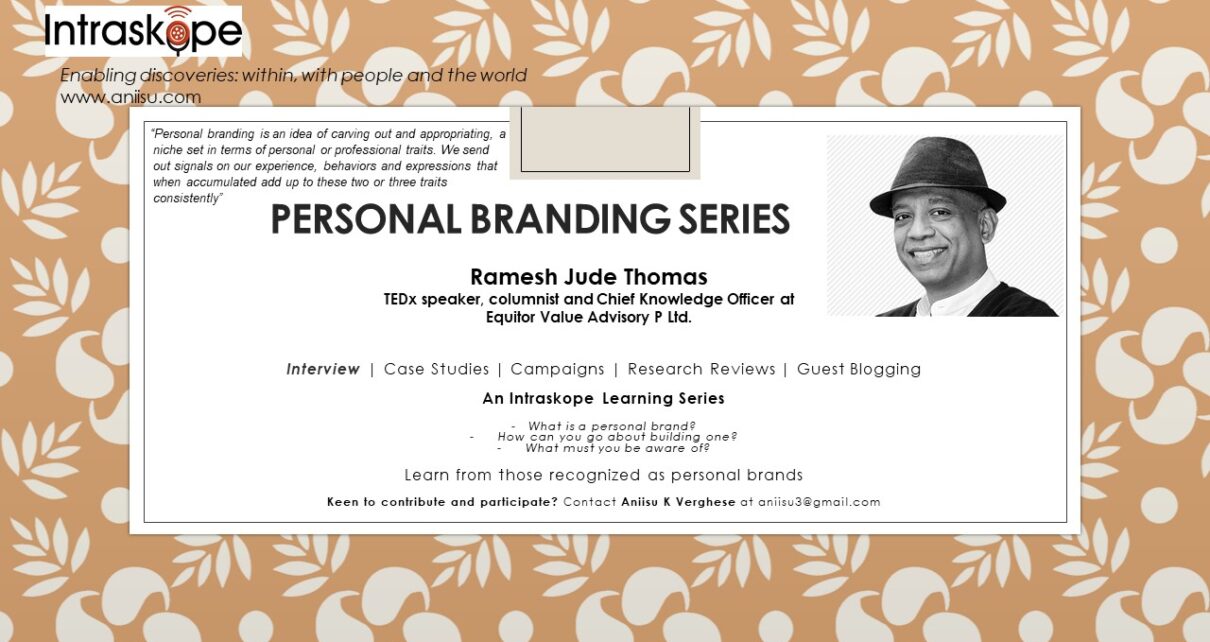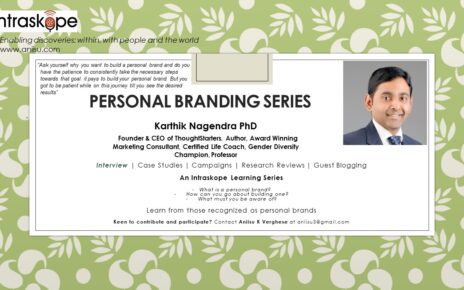As the pioneer of brand valuation in the country, Ramesh Thomas knows a fair bit about harnessing business potential and capital. A TEDx speaker, columnist and founder of Equitor Value Advisory, Ramesh is sought after for his thoughts on branding and strategy. Our families know each other for decades and I have followed his journey starting with research, advertising and to brand valuation. In this chat, he shares insights on personal branding approaches and practices to differentiate and thrive. Read on and watch the video interview.
“If you really want to do this please be very clear what it is that you want to own. What traits will differentiate you in that space that you want to do. What can people associate with you and then most importantly, what you want to establish your brand with. But what specific ways they can really leverage who you are. It’s not about having a nice fancy story which you put out – the two pillars of differentiation and relevance must be present.”, says Ramesh.
In the 22nd edition of Intraskope‘s Personal Branding Series, Ramesh shares anecdotes and real-life cases of how personal branding can make or mar people. Gain from these insights.
Watch the YouTube video interview and read the complete interview below. Look up more such stories on my YouTube channel and on LinkedIn.
Interview
1. What according to you is personal branding?
At its most basic level, personal branding is an idea of carving out and appropriating, a niche set in terms of personal or professional traits. So, for example, when someone says, he is the most generous person in the neighborhood. People will say “yeah that makes sense he is actually been generous”, or you might say,” she is the most skilled writer in the firm”. So, there’s an appropriation of professional taste in the second level. Even though we may not have applied science to this domain over the centuries, people typically have some level of personal branding, because if you ask 30-40 people about you, you may get different words, but give or take those multiple words, it will come back to the same two or three traits. Which means without having thought too scientifically about it, you send out signals in terms of experience, behaviors and expressions that when totaled up add to these two or three traits consistently. Therefore, you have in some sense appropriated it. Some people do it more professionally – that’s the next level. The question also is to what extent can you monetize it? Some people have done a very smart job of building and monetizing their personal brands.
2. Do you consider yourself a personal brand? If yes, how do you know it?
The fact of the matter is that if you remove all the bells and whistles, we introduced brand valuation to India, when it was a completely new notion. And since it started getting used, let me say that we leveraged it quite a bit. We got associated with brand valuation, because the signs were clear. if you if you put my name on a Google search or if you put my firm’s name on it, you will immediately get these words. We are quite easily associated with the term brand valuation., There has been a very sharp appropriation. Even globally or in India, it hasn’t become a household name, but amongst people who matter, and in the community. There is a close and specific association with this skill with us. I was personally involved in bringing brand valuation to the fore, the personality aspect of that stuck with me. So, there are two ways that, you know that you are making progress as a personal brand. You want to carve out a place for yourself in that space. If you want to be a successful cricketer or a movie star, you start doing all the right things – you put yourself out there, you get to the right party because you want to throw yourself into what you see is an attractive space. For me it was not like that. It was a bit of a bizarre idea at that point of time – that a brand, could have value. The plan was one thing which was very tightly engrained – the communication, the logo, identity and all that stuff. There’s a very linear left-brain business aspect to it, which we must consider making the personal brand a reality. It was something which is the truth which had not been revealed, and therefore I said okay we’ll talk about it. To make it appear as reality you need to establish it as a useful skill, and as a practice, Dr. Martin Luther King took a long time to establish equal rights for all the people in America, especially for the disenfranchised. He did it in the very end and he said I don’t want it the violent way. Because he believed in it, it happened. You can profit in two ways – one through a strong belief in which you build a space, or a space for yourself, which is not already occupied, or which is popular. Second, you need to take a stand and do it over time.
3. Who according to you are personal brands whom others can follow and learn from?
If I look at personal brands, what comes to mind is tenacity and about material results. If you look at India, for example, if you’re talking to an Indian audience – what is Amitabh Bachchan? He’s a successful movie star and has been a movie star, and I’ve used in both those words quite responsibly. I think he sits far above the category. Because he has demonstrable traits, which are not of the category. For example, t’s never known that he comes late for a shoot or for a meeting. He is never known to speak brazenly about himself. He is extremely understated. He is extremely disciplined. He treats other people with respect. So, he has built some traits which sit above the category, although at some level the platform which he has used is a space of film in India. Let’s take Tendulkar for example. He sits above the category and all the traits are obvious, but again, for better or for worse. He has he sits about the category. and with first the brand is – you always think of him as a cricketer. Federer is somebody who has demonstrated traits, which are very different from just the category of being a great tennis player. As a sports person, as a sporting person, as a human. As a caring human being, he has demonstrated far more so he leaves the sport behind quite a bit. And the last one which of course very interesting to me personally is someone like Dr. Devi Shetty. Again, a successful heart surgeon, probably the most successful in the country today – may not be the most commercially successful. Again, the category. Cares about the progress of healthcare in India, and where it can go, where India can go with the capabilities. He is always thinking of taking causes with the government and has always been making contrarian statements. He is also extremely well known in his category. That’s what makes them personal brands.
4. What challenges did you face while building a personal brand? What techniques did you use?
When you take a journey like mine or Dr. King, for example, these are difficult journeys because it’s contrary to the prevailing narrative. And then you say, blacks must have rights or brands must have value. The first thing that comes to mind is ‘hey, that’s not possible’. I’m talking about in the 60s, when you ask a question – ‘What do you mean by rights? They were slaves, what rights?’ In the 2000s when, people like us came up and said brands have value, people said, What do you mean by that? How do you do that, and the accountants also started laughing You know, the point is, when you start a journey like that, the biggest thing is, there is no such narrative available. The narrative itself becomes the platform on which you can build the personal brand. And you ask the question about personal branding, but at that point of time, the idea was not. The idea was to save this ideology. This thinking is critical to India – if nobody’s doing, I want to do it. The focus was not on personal branding. The product was that people started associating me with the product. Of course, later the company and with the friends was running the narrative. It is not a bad thing because once people start saying – ‘Oh, it’s that guy who talks about brand valuation. Let’s listen to what he has to say’. Then what happens next is newspapers start talking about what is this all about? Is there anybody who has done it? has done it for everybody? Then, academic institutions like MBA programs say, that sounds interesting. Can you come and spend an hour and a half with our students? Is there a course you can create? I created courses for two or three institutes like MICA etc and spoke about it at many places. So what, at least because it’s a curiosity. So that’s how they are saying, here is a very new kind of an approach we could do, or can we do something with our brand which demonstrate value for shareholders? And when that happens, then it’s magic, because something concrete has grown and has got monetized. A little more because of the cost that we do. I mean, shares go up tremendously and we have seen that, because of the work that we do. So that’s interesting narrative which people keep spilling out.
5.Oorganisations always say that employees are their biggest assets and we need to value, but also forget that employees are personal brands. So is there a way in which organizations can think of valuation from that context and personal branding becoming valued?
The first and most important thing is you must understand the importance of statement and the question that you asked. And there are three areas in which this becomes quite sharp. So, for example if you take the large consultancies, it’s a people’s business. The good consulting leaders who have good relationships with their clients, it is dangerous for that brand in that business for his agency if the individuals leave. You can see that with advertising agencies. How many advertising agencies have sprouted up? Therefore, from personal branding perspective, it is dangerous for their own business. Even if you take the example of Dr. Devi Shetty or Dr Naresh Trehan, two of the best names in cardiac care in this country. When Dr. Shetty was in Manipal, he started Manipal Heart Foundation. Manipal Foundation was equal to Dr. Devi Shetty. It was very easy for them to set up new stuff because people were willing to put money into their personal brands, not as ex-employee of Manpial or something like that. They have very strong brands for themselves. So, this is true, the employees, sometimes are very strong personal brands, even while existing will continue to work in their organizations, but never stops.
6. How can someone starting from scratch build a personal brand? What is the first step he or she must take?
Let’s take a couple of examples that we have worked with. To make the point. It was about 10 years ago. A doctor came to us – well known for angioplasty that he used to practice. Now, it was a very strange request which came through his chartered accountant. He reached out to my colleague in Bombay and said that we want you to do a brand valuation for the doctor. It seemed like a bizarre request and also my colleague himself was a little bit surprised. So we had a conversation with the doctor, who was a really busy man. To cut a long story short, we asked him a simple question – so why’d you want to do this? And the guy pulled out a Sony Viao and he showed us a chart. This is when I joined the hospital, and this is where I was able to bring them revenues and volumes. You could clearly see he had plotted the number of patients he has treated by the amount of money charged per patient. So is this not brand valuation. I mean, maybe I said I thought I knew the subject. So long story short, we did a valuation for him because we knew that he knew what he was talking about what he wanted. And why because he was having difficult time in terms of his commercial relationship with the hospital. He knew the entire practice exists because of two things – his reputation and capability. These are intangible assets that he brings to the table. We did help with a defense, so that he would have a meaningful commercial conversation with this hospital. He could establish that his brand is what brings most value to run the practice of angioplasty. He had many firsts to his name. For example, he pioneered the idea of radial angioplasty in India. Brand valuation had to have another conversation. So, my advice to people is if you really want to do this please be very clear what it is that you want to own. What traits will differentiate you in that space that you want to do. What can people associate with you and then most importantly, what you want to establish your brand with. But what specific ways they can really leverage who you are. It’s not about having a nice fancy story which you put out – the two pillars of differentiation and relevance must be present. Then you must work actively towards underscoring by speaking and reiterating the narrative. The appropriation and leverage are what matters.
7. There are celebrities out there who are insuring various parts of their anatomy and various parts of it, you know, the physical appearance and like the voice and the tongue and hair and all that sort. But that’s one part of who they are. What do you make of this trend?
Human beings have difficulty in grasping something that is not material. So the fact that J Lo, was an entertainer, is a big one. The problem is the material aspect that they associated with her was her buttocks. And I think she used it quite cleverly. Therefore, her buttocks was insured for over 27 million plus dollars. Cristiano Ronaldo is a fabulous sports person, well known and one of the most enjoyable to watch in history. The material definition of him, since he was a footballer was his legs. Therefore, they put a hell of a lot of money to insure his legs. It’s a reductionism of the worst kind. It comes down to a pair of buttocks or a pair of legs or a pair of lips – it’s not the whole picture. What do the insurers want to insure? They want something material to insure.
8. With COVID19 and other crises what steps can personal brands take?
Quite easy. I was having a conversation with a millennial, and one of your questions was what life has been very easy for people, for many years. And you know, the conversation was really about a forward doing the rounds – of about how Sound of Silence to be a famous song. Right. But there was, there is this piece. There’s a story about how this blind person who was Art Garfunkel’s friend actually was the inspiration for that song. So she was asking me, have people been so kind. Do you see people being so good. I think COVID is a good example. Because of the Second World War, after you have lost 75 million people and two thirds of the Jewish community was wiped out, human beings came together in a manner never seen in history, at least our recorded history. The whole world came together and the consequence of that was great brands, great art and great music, great business models all sorts of interesting things came out. So, in a crisis like this, when people are coming together that connectivity in any case is going to become natural. How do you put yourself out in a heightened connectivity which you can see today? We’re all caring for each other. We’re all wondering whether our friend is well – these are concerns that we have. In this heightened connectedness, how can you establish who you are very quickly – that’s the best way that you can use COVID.
9. What is your recipe for personal branding success?
Stay highly focused and stay highly relevant. So, empathy is very important. In that empathy if you know your role, you will naturally and automatically become a very powerful personal brand. if you stay focused and you stay relevant, you will make it.
Liked this interview? Please do share your feedback and comments.
Keen to get ahead with your personal brand? Here are some resources:
- Take this course – Personal Branding 101: Unlock Your Potential and Stay Ahead
- Take a FREE assessment on personal branding.
- Refer to the 3C model on Personal Branding
- Sign up for a 60-minute personalized chat on personal branding
- Personal branding for corporate communicators
Missed the earlier episodes? Read the interviews with Muqbil Ahmar, Tinu Cherian Abraham, Joseph Fernandez, Christina Daniels,Karthik Srinivasan,Gautam Ghosh, Alexander Michael Gittens, Mubeen Azeez, Itzik Amiel, Mangal D Karnad, Abhijit Bhaduri, Sandeep K Krishnan PhD, Scott Shirai, Sunil Robert, Latha Vijaybaskar PhD, Abha Maryada Banerjee, Dr. Amit Nagpal, Sukanti Ghosh, Amith Prabhu, Dave Carroll and Prof. Deva Rangarajan online and share your thoughts.
Keen to join this Series and share your thoughts on Personal Branding? Write to me at aniisu3@gmail.com
Please subscribe to my YouTube Channel and follow me on Medium.
#brandvalue #personalbrandvaluation #domainknowledge #customerfocus #personalbranding #lifeskills #clarity #commitment #consistency #addvalue #buildexpertise #reinventyourself #focus #branding #drive #communications #fulfilment #courage #confidence



